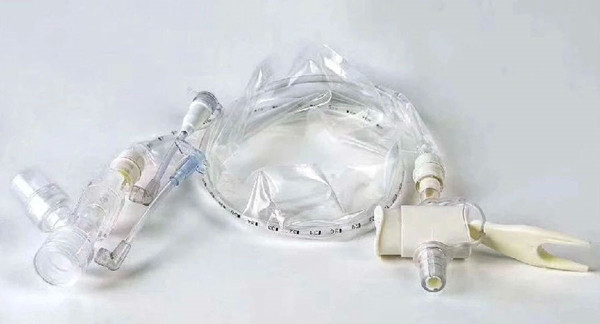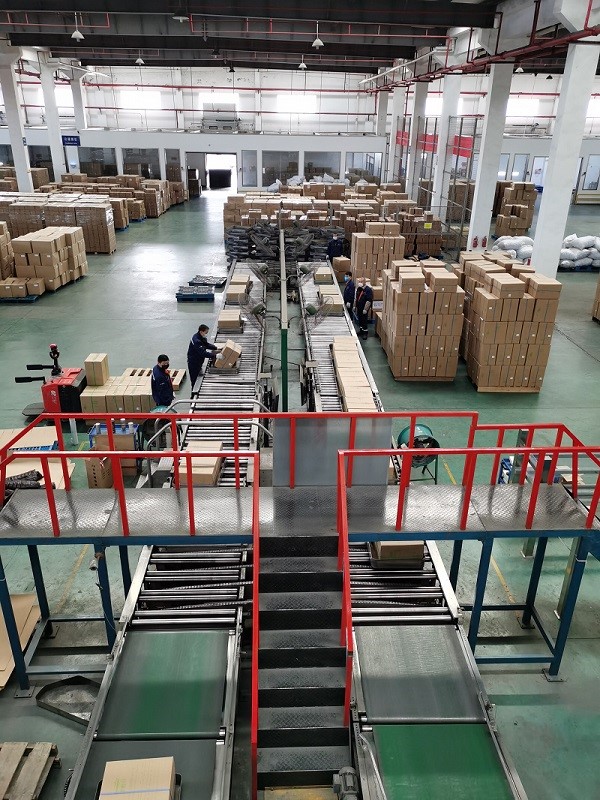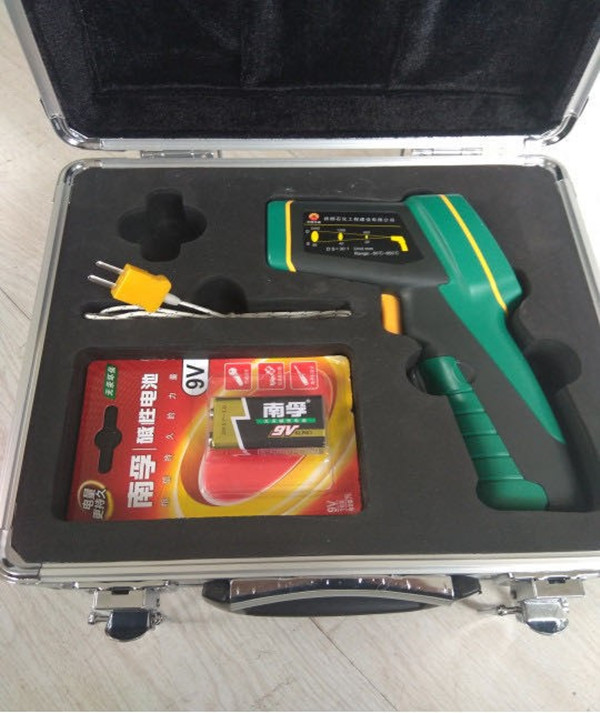Medical 'Weapons' for Anti-Epidemic Battle
Varieties of facilities and devices were developed during the outbreak of novel coronavirus pneumonia (NCP) to help screen temperature, block virus transmission, monitor information and support drug production.
CNBM's "black technological" materials aid epidemic prevention, control and treatment
The infrared thermometer and screener are high-tech devices that quickly and accurately measure body temperature.
China Building Materials Academy, a subsidiary of China National Building Material Group Co., Ltd. (CNBM), has produced more than 800 sets of highly accurate infrared lenses which have been sent to companies and institutes including Red Star Yang Technology in Wuhan, Hubei Province, the area most affected by NCP, and the Changchun Institute of Optics, Fin Mechanics and Physics of the Chinese Academy of Sciences.
The lens is made of 8 to 12-micrometer infrared chalcogenide glass which has high transmittance and is capable of measuring temperature accurately in a short time.
The infrared thermal imagers featured with such lenses can quickly detect temperature of several people at the same time. So far, the devices have been adopted in such first-tier cities as Wuhan in Hubei, Guangzhou in south China's Guangdong Province and Chengdu in southwest China's Sichuan Province.

The highly accurate infrared lens is produced with 8 to 12-micrometer infrared chalcogenide glass by the China Building Materials Academy. [Photo/sasac.gov.cn]
The Huayi branch of Triumph Science & Technology Co., Ltd produced a kind of coated glass dedicated to forehead thermometers that is a key component of the LED screen of many medical devices and temperature screeners.
In addition, 10 million neutral borosilicate glass tubes for packing of injections produced to international standards have been made by CNBM's subsidiary Triumph Junheng Co., Ltd. The tubes were supplied to institutes nationwide developing vaccines for the novel coronavirus.
CNBM also contributed to production of closed suction catheters. Nanjing Shuangwei Biotechnology Co., Ltd. used the PU thin film protective jacket to design an isolating valve for the catheters which lowered the possibility of leaks or cross infection.

The closed suction catheters produced by Nanjing Shuangwei Biotechnology Co., Ltd. [Photo/sasac.gov.cn]
Some of those CNBM materials and products are critical front-line supplies.
The green universal board completely developed by Beijing New Building Material (Group) Co., Ltd., also a subsidiary of CNBM, was widely used in construction of cabin hospitals during the epidemic outbreak.

Jiangxi Sinoma New Solar Materials Co., Ltd. delivered 100 sets of the new type of foaming ceramic partition board for hospitals in Jiangxi Province. [Photo/sasac.gov.cn]
Another kind of construction material – a new type of foaming ceramic partition board – was also used in fast construction of quarantine wards, consulting rooms and sterilizing rooms to separate clean and infection areas.
The boards were produced by Jiangxi Sinoma New Solar Materials Co., Ltd. So far, 100 sets of partition walls for standard quarantine wards have been used in specific hospitals in East China's Jiangxi Province.
Demand for fiberglass air filter paper has greatly increased since NCP broke out as such material plays a key role in air filtering and is widely used in pharmaceutical and surgical fields.
The high efficiency fiberglass air filter paper produced by CNBM's affiliated company – Nanjing Fiberglass Research & Design Institute Co., Ltd. Membranes Technology Company – has a particle filter rate of 99.97 percent and has better performance in filtering one to five-micrometer diameter aerosol particles, which greatly inhibits spread of the virus.
The company has delivered dozens of tons of the air filter paper to the Huoshenshan and Leishenshan hospitals.
The materials were also adopted in sterilizing rooms as well as supporting systems like air showers, delivery windows and air conditioning and air exhausting systems in some medical projects in Beijing and Shanghai. Filters on ambulances were also renovated to use the filter paper.
CGN develops irradiation sterilization technology to promote medical article production
China General Nuclear Power Corporation (CGN) is using electron beam irradiation sterilization technology to help speed up production of masks and protection suits.
The technology uses high-power electron beams produced by acceleration of a high-voltage electric field to destroy microbial structures, making microorganisms lose their bioactivity. It has a better sterilization effect than traditional methods.
What's more, compared to chemical fumigation which takes seven to 14 days, it takes only 20 to 40 minutes to sterilize via electron beam irradiation.

The radiation sterilizing assembly line [Photo/sasac.gov.cn]
CGN subsidiary CGN Nuclear Technology Development Co., Ltd. had provided more than 5.4 million articles valued at nearly 14 million yuan ($1.99 million) to the front-line by the evening of Feb 14.
The company has opened full radiation sterilizing centers in various regions including Suzhou and Nantong of east China's Jiangsu Province as well as Shenzhen in south China's Guangdong Province since the epidemic broke out, and offers free, fast, in-time and high-quality sterilizing services for more than ten kinds of anti-virus articles like masks, medical gloves and protection suits.
In addition, technology for sterilizing medical waste was developed by CGN Nuclear Technology Development Co., Ltd. in cooperation with Tsinghua University.
The company is also working on solutions for sterilizing medical wastes containing the novel coronavirus by radiation.
CNPC develops super fast thermometer to aid front-line
Two high-accuracy low-temperature infrared thermometers developed by China National Petroleum Corporation (CNPC)'s Fushun branch in northeast China's Liaoning Province were sent to Wuhan on Feb 11.
The company had installed another ten thermometers of the same type on Fushun's expressway to help detect people's temperature.
The device was initially developed for temperature detection on extremely cold days. It can work normally when it is as cold as minus 50 degrees Celsius.
The device can detect people's temperature within three meters which lowers the possibility of cross infection.

CNPC's extremely-cold temperature infrared thermometers [Photo/sasac.gov.cn]
CMGB launches anti-epidemic information system to help win the battle
The Harbin, Heilongjiang Province-based HIT Zheng Yuan, a subsidiary of China Metallurgical Geology Bureau (CMGB), took full advantage of the central SOEs' talent resources and college platforms to create several anti-epidemic systems which have contributed much to epidemic prevention and control in Heilongjiang Province.
The systems are used to monitor employees and students' health conditions and detect any development of the epidemic.
CECEP shares monoclonal antibodies with scientific researchers
Vanliant Co., Ltd., a subsidiary of China Energy Conservation and Environmental Protection Group (CECEP), recently screened two monoclonal antibodies which might be able to recognize the recombinant protein of the novel coronavirus with detection. A batch of one antibody is in production.
To improve research efficiency and accelerate developments in the fight against the virus, the company shared the first batch of the monoclonal antibody injections with researchers.
Future research will verify whether it can be used in antigen detection reagents, vaccine development and antibody drug production.
China Chengtong puts on protection suits for taxies
If protection suits are a must for medical workers to avoid the virus, then what can help protect taxi drivers and their passengers?
To lower cross infection between taxi drivers and passengers, a logistics subsidiary of China Chengtong Holdings Group Ltd. (China Chengtong) developed a kind of protective isolating film.
The film is made of PVC film and is pasted on the internal roof, a frame dividing front from back and the foot pad in front of the back seats, forming a "wall" between the driver and passengers. The separation of the two spaces prevents the virus spreading through droplet transmission.

The protective isolating film on taxies [Photo/sasac.gov.cn]
China Electronics launches AI system to aid anti-virus battle
A subsidiary of China Electronics Corporation (China Electronics) launched three systems to generate reports about the epidemic condition, temperature screening and facial recognition entrance controls.
The three systems are now used in cities like Shenzhen and Chengdu.
(Executive editor: Wang Ruoting)



